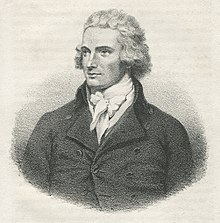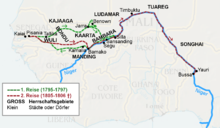Water music (novel)
Wassermusik ( English Water Music ) is a novel by the American writer T.C. Boyle , which was published in the USA in 1982 and in German in 1987 (translator: Werner Richter, newly translated in 2014 by Dirk van Gunsteren ).
content
The book tells the story of the (historical) Scottish Africa explorer Mungo Park , who undertook two voyages of discovery into the interior of Africa towards the end of the 18th century. He is obsessed with the desire to discover Niger , which he succeeds after all sorts of efforts. But after his return home, he cannot endure normal everyday life for long and longs for new adventures. He wants to return to Africa and now to continue exploring the Niger, especially its confluence with the Gulf of Guinea .
Neither his wife Ailie, who had been waiting for him for years on the first trip, nor his children can keep him from this desire. And so he sets off again.
The African Johnson is also among Mungo's companions. He is Mungo's interpreter and has an eventful history. As a boy, he was first sold by slave traders to America , from where he was taken to London by a well-meaning English nobleman. There the now fairly educated Johnson develops into a kind of dandy . But after a successful pistol duel , Johnson is arrested and banished to Africa.
Parallel to Park's story, that of Ned Rise takes place, who tries again and again to make his fortune and almost manages to do it before falling back to the ground. His misfortune begins with his birth. Immediately after his birth, he is looted from his mother (a drunkard) by an old hag (who appears again and again in the course of the novel). Later he comes under the “care” of a lazy drunk who mutilates Ned's hand so that he can work as a beggar. But Ned is lucky and is accepted by a lord who almost lovingly raises him and gives him a respectable level of education. After his supplier is shot dead by Johnson in the said duel, Ned finds himself back at the bottom. This is not the last time in history. (But it's not for nothing that his surname is "Rise" - English for " to stand up ".)
Towards the end of the story, on Mungo's second trip to Africa, the paths of Ned Rise, Mungo Park and Johnson finally cross. Rise recognizes Johnson as the man who killed his foster father in a duel, but only after Johnson left the group. The expedition ends with the death of everyone involved, with the exception of Ned Rise, who is taken in by pygmies and does not return to Europe.
book
- TC Boyle : Wassermusik (novel), hardcover: Rogner & Bernhard, Hamburg 1987, ISBN 3-8077-0224-5
- TC Boyle : Wassermusik (Roman), paperback: Rowohlt, Reinbek bei Hamburg 1990, ISBN 3-499-12580-3
criticism
“» Water Music «is one of TC Boyle's great novels. The threads of action, which initially run parallel to each other - of adventurers, hookers, deceivers and half-silk figures in the half-worlds of Scotland, London and Africa - finally move on the Niger towards the source of the current. It is a story of madness, ambition and greed, but also full of wit, rich in facts and with cliff hangers, the outcome of which is really as unclear as the course of the current. "
“We are dealing with a mixture that is as enjoyable as it is astounding and occasionally annoying: a picaresque novel that uses historical facts as confidently as it ignores them. (...) So a Scheherazade, in which a crocodile sometimes plays the harp because the instrument sticks in his teeth after the harpist has eaten it, or a friend who has become angry is tied up like a capon to ogre . "
radio play
The novel was produced in 2005 by Norddeutscher Rundfunk as a radio play in five parts (approx. 273 minutes).
- Editing and direction: Leonhard Koppelmann .
- Music: Henrik Albrecht .
- Actors: Thomas Fritsch , Udo Schenk , Doris Kunstmann (as narrator for Mungo, Ned and Ailie) , Andreas Pietschmann (Mungo Park) , Matthias Koeberlin (Ned Rise) , Anna Thalbach (Ailie Anderson) , Horst Bollmann , Traugott Buhre , Peter Fricke (Twit, Banks and Durfeys, the gentlemen of the African society ) , Michael Habeck (Johnson) , Barbara Nüsse (the old woman ) u. v. a.
literature
- Mungo Park : Travels in the Interior of Africa. Wordsworth, London 2003, ISBN 1-84022-601-3 (historical travelogue )
Web links
Individual evidence
- ^ Matthias Penzel: Review of the NDR radio play production ( Memento from October 27, 2007 in the Internet Archive ) by Wassermusik, Rolling Stone, July 2006
- ↑ Fritz J. Raddatz: An infinite string. Die Zeit, No. 13, 1988

